 Regardless of one's views on whether or not the socialist left should support Bernie Sanders in his race for the White House, the momentum behind the self-described “democratic socialist” has been impressive. Beginning at 2% in April, his popularity grew to 14% in May and at last check was 32% in New Hampshire.
Regardless of one's views on whether or not the socialist left should support Bernie Sanders in his race for the White House, the momentum behind the self-described “democratic socialist” has been impressive. Beginning at 2% in April, his popularity grew to 14% in May and at last check was 32% in New Hampshire.
Sanders and the Middle East
Assessing the Sanders Campaign
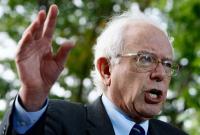 How are we to assess the Bernie Sanders presidential campaign?
How are we to assess the Bernie Sanders presidential campaign?
There are three reasons that one runs a candidate for president. One is the hope of winning, second is to influence other candidates to modify their views, and third is to use the campaign to build for the future, either educationally or organizationally.
Over 1,000 local union leaders and members back Bernie Sanders for President
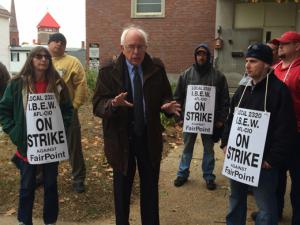
Grassroots labor initiative urges Democratic primary support for Sanders by AFL-CIO and national unions.
Over 1,000 union activists from around the country today kicked off Labor for Bernie 2016.
Sanders and Independent Politics
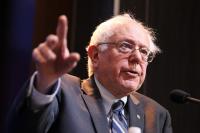 Despite his relatively low poll numbers at the moment, Bernie Sanders’ bid for the Democratic presidential nomination is catching fire and will undoubtedly attract a great many more supporters in the months to come. For radicals, and especially for socialists in the “third camp” tradition (so called from the time of the Cold War, when our tendency stood for revolutionary opposition to both camps) this poses a challenge.
Despite his relatively low poll numbers at the moment, Bernie Sanders’ bid for the Democratic presidential nomination is catching fire and will undoubtedly attract a great many more supporters in the months to come. For radicals, and especially for socialists in the “third camp” tradition (so called from the time of the Cold War, when our tendency stood for revolutionary opposition to both camps) this poses a challenge.
What Went Wrong–and Why
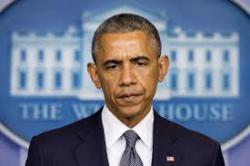
So why did things go so wrong under the leadership of President Barack Obama? David Bromwich has written an informative and important critical article on the Obama presidency, critical one might say from the progressive point of view, titled “What Went Wrong: Assessing Obama’s Legacy” which appears in the June issue of Harper’s. Fundamentally, Bromwich sees Obama as a weak president who has consistently pursued the “path of least resistance” rather than the “path of courageous resistance.” He was, says Bromwich, a president who mistook talk for action, who avoided political conflict and struggle, and who missed opportunities that presented themselves, moments when he might have advanced a progressive agenda.
Bernie Sanders as I've Known Him
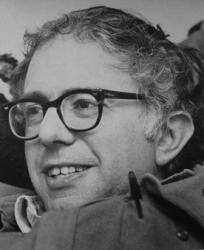
I haven’‘t had a chance yet to write up my own view of the Bernie Sanders campaign, but I want to give some background, going back to 1980, on what I know about the man.
In 1980 I was in Vermont trying to get on the ballot for the Presidential campaign – seeking the line of Liberty Union, a minor party which had hoped to become a ‘‘second party” in Vermont.
Liberty Union’s own history goes back to the late 1960’s when there was an effort in several states, at the height of the Vietnam War, to get alternative radical views on the ballot. The main base for this effort was in California, with the Peace and Freedom Party which, in 1968, nominated Eldridge Cleaver for President. (I ran for Congress in Lower Manhattan on that ticket that year, picking up the endorsement of the Village Voice and getting nearly 5% of the vote).
A Socialist FAQ on Bernie Sanders and the Left

The following introduction is by the editors of SocialistWorker.org where this FAQ was originally published.
Bernie Sanders kicked off his campaign for the Democratic Party presidential nomination with a large and enthusiastic rally in Burlington, Vermont, on May 26.
Sanders’ candidacy has prompted discussion and debate among a left shaped by recent struggles such as Occupy Wall Street, the Chicago teachers strike, Fight for 15, Black Lives Matter and the climate justice movement. Many radicals, publications and organizations either support Sanders’ Democratic Party run outright or believe his campaign can be used to build the infrastructure for a stronger left. By contrast, SocialistWorker.org has argued Sanders’ campaign will serve to corral and co-opt the emerging left into supporting the Democratic Party–and make it harder, not easier, to build an independent, left-wing alternative.
Here, Ashley Smith and Alan Maass respond to some of the questions and disagreements posed by SocialistWorker.org readers during the course of the discussion so far.
Bernie Sanders is no Eugene Debs
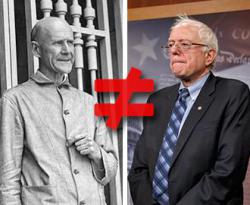
Bernie Sanders’ entry into the Democratic presidential primaries should be seen as his final decisive step away from the democratic socialism he professes to support. He will raise some progressive demands in the primaries and then endorse the corporate Democrat, Hillary Clinton. Nothing changes.
Sanders is violating the first principle of socialist politics: class independence. The socialist movement learned that principle long ago when the business classes sold out the workers in the democratic revolutions of 1848 that swept across Europe and parts of Latin America.
The Sanders Campaign and the Democratic “Party”
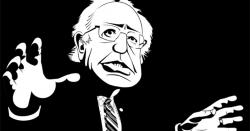
I appreciate the nonsectarian tone of the piece on Bernie Sanders’ presidential campaign by my longtime fellow New Politics editorial board member and friend Barry Finger. I think he has a better, more sophisticated understanding of the peculiarities of the Democratic Party (DP) and the U.S. electoral system than do many on the radical left that refuse to support any DP candidate regardless of that candidate’s personal political platform. However, I think that Barry still suffers from certain misunderstandings regarding just how different the big two U.S. political parties are from political parties that exist anywhere else in the world, and this means there are defects in his suggestions as to how left-wing socialists should relate to the Sanders campaign.
Campaigning With Bernie, Then and Now: Why Labor Should Give Sanders Strong Primary Election Support

When I first met Brooklyn-born Bernie Sanders, he was a pretty marginal figure in his adopted state of Vermont. It was 1976 and he was running, unsuccessfully and for the fourth time, as a candidate of the Liberty Union Party (LUP).
Never heard of it? Well that’s understandable because only Vermonters are still afflicted with its enduring flakiness. Liberty Union (LUP) was a radical third party spearheaded by opponents of the Vietnam War who had, like Bernie, washed up in the Green Mountain State as “the Sixties” subsided.
Three Conferences and a Postscript

Dan La Botz’s description of the Future of the Left/Independent Politics Conference makes another introduction redundant. Instead, I’ll add my own observations. I come from the other side of this discussion: I hold with the `inside/outside’ approach to electoral politics, as pushed by the late Arthur Kinoy, a radical lawyer who led the National Committee for Independent Political Action in the 70s and 80s. Putting it simply, I supported left independent Barry Commoner for president in 1980, and Democrat Harold Washington for mayor of Chicago in 1983. This year, I support Kshama Sawant and Bernie Sanders. I see no contradiction – in fact I think it’s the only approach that makes sense.
Electoral Guide 2016
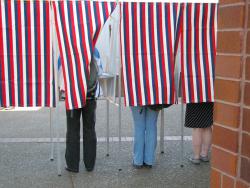
Any discussion of this subject needs to be based on the understanding that, at present, voting is carefully designed to, in Chomsky's words "reduce the population to apathy and obedience", putting us in a position where we are forced to demonstrate our fealty to the corporate state by actively endorsing one of its two anointed representatives.
The Only Article You Need to Read about the 2016 Election
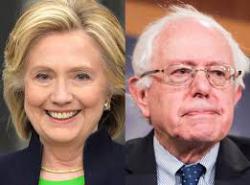
This is the latest in a series of articles discusing the pros and cons of a Bernie Sanders campaign in the Democratic Party. Scroll down to find other articles. – Ed.
In the general election, the Democrats need the left to be silent about how bankrupt and corrupt the party is so it can gloss its rush to the right in a veneer of progressive rhetoric.
If you’re progressive or on the left, here’s your cheat sheet on how to participate in the 2016 presidential election, which is just 18 months away. If you live in one of the first states in the Democratic primary process, like Iowa, New Hampshire, or South Carolina, vote for Bernie Sanders. You can also sign an online petition for him, if you’re into that sort of thing. If you chance upon one of his campaign rallies and have nothing better to do, join the crowd.
But don’t do anything else. Don’t become a campaign volunteer, do phone banking, door knocking, get the vote, and certainly don’t send him a dime of your money.
Bernie Sanders Calls for Political Revolution Against Billionaires: Campaign Needs to Build Independent Political Power
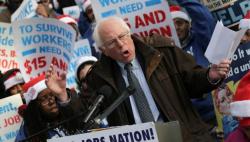
This is the latest in a series of articles discusing the pros and cons of a Bernie Sanders campaign in the Democratic Party. Scroll down to find other articles. – Ed.
Boldly calling for a “political revolution” against the “billionaires and oligarchs” who have hijacked the political system, Bernie Sanders has launched an insurgent campaign for President. The only self-described socialist in Congress, Sanders explained his decision to run to ABC News, saying “We need a political revolution in this country involving millions of people who are prepared to stand up and say ‘Enough is enough,’ and I want to help lead that effort.”
Bernie Sanders is a thoroughbred—why call him a stalking horse?

Voltaire wrote that “the best is the enemy of the good," but he cited it as a foible and not a redeeming practice. Within hours of Bernie Sanders announcing his candidacy for the Democratic Party presidential nod on April 30th, in some warrens of the radical left, the long corrective knives were already out for the only socialist in Congress. Why? Because Bernie is just not good enough, they said. Criticism ranged from his being a faux socialist, a stalking horse for Hillary Clinton whose backing by the left would be a practical waste of a year that could be better spent building a movement. Politicking for a candidate who can’t win the nomination and who would be destroyed by corporate America and an avalanche of corporate funding if somehow he did was seen as a mug's game.
They would be wrong.
Run, Bernie, Run!
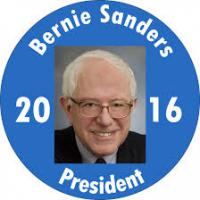
This is the latest in a series of articles discusing the pros and cons of a Bernie Sanders campaign in the Democratic Party. Scroll down to find other articles. – Ed.
“If you had a President who said: `Nobody in America is going to make less than $12 or $14 an hour,’ what do you think that would do? If you had a President who said: `You know what, everybody in this country is going to get free primary health care within a year,’ what do you think that would do? If you had a President say, `Every kid in this country is going to go to college regardless of their income,’ what do you think that would do? If you had a President say, `I stand here today and guarantee you that we are not going to cut a nickel in Social Security; in fact we’re going to improve the Social Security program,’ what do you think that would do? If you had a president who said, `Global warming is the great planetary crisis of our time, I’m going to create millions of jobs as we transform our energy system. I know the oil companies don’t like it. I know the coal companies don’t like it. But that is what this planet needs: we’re going to lead the world in that direction. We’re going to transform the energy system across this planet-and create millions of jobs while we do that.’ If you had a President say that, what kind of excitement would you generate from young people all over this world?”
-Bernie Sanders, from the November, 2013 issue of The Progressive
Presidential Candidate Bernie Sanders: Sheepdogging for Hillary and the Democrats in 2016
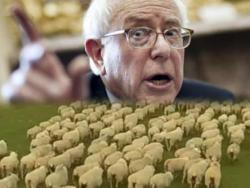
“The sheepdog is a card the Democratic Party plays every presidential primary season when there's no White House Democrat running for re-election.”
Spoiler alert: we have seen the Bernie Sanders show before, and we know exactly how it ends. Bernie has zero likelihood of winning the Democratic nomination for president over Hillary Clinton. Bernie will lose, Hillary will win. When Bernie folds his tent in the summer of 2016, the money, the hopes and prayers, the year of activist zeal that folks put behind Bernie Sanders' either vanishes into thin air, or directly benefits the Hillary Clinton campaign.
Bernie Sanders's Presidential Bid Represents a Long Tradition of American Socialism

This article is republished here with the permission of the author, Peter Dreier, and of American Prospect.
Now that Bernie Sanders has entered the contest for the Democratic Party’s presidential nomination, Americans are going to hear a lot about socialism, because the 73-year-old U.S. senator from Vermont describes himself as a “democratic socialist.”
Deflategate: What Does it Tell Us about America?

Deflategate has driven virtually every other story off of the news shows and talk shows for several days now. At the center of the controversy is Tom Brady, quarterback of the New England Patriots, who, a National Football League report says, very likely knew that Patriot employees were involved in deflating several footballs to give Brady and the Patriots an advantage in the American Football Conference Championship Game of the 2014 season. Pundits have called the Brady and his team ”cheaters” and “liars,” though interestingly Governor Chris Christie—also accused of being a cheater and a liar—defends Brady, saying people are just jealous of those whose lives seem so perfect.
Bernie for President
 We should welcome Bernie Sanders' run, while being aware of its limits.
We should welcome Bernie Sanders' run, while being aware of its limits.
"I am not a capitalist soldier. I am a proletarian revolutionist. . . . I am opposed to every war but one.” So said Senator Bernie Sanders in 1979, reciting a speech from five-time Socialist Party of America presidential candidate Eugene V. Debs for a Folkways Records collection.

